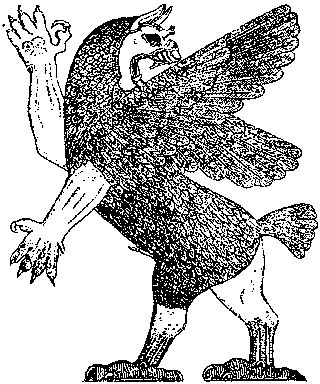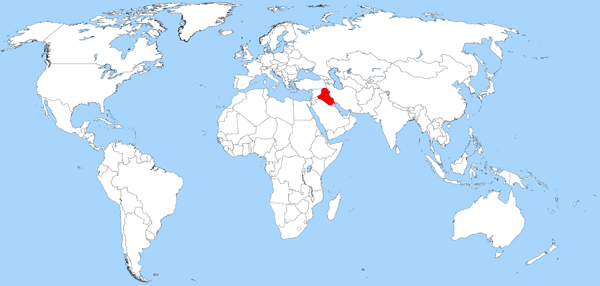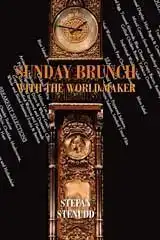
Enuma ElishThe Babylonian Creation Myth
The Enuma Elish CreationEnuma Elish is the old Babylonian creation myth, which has been preserved for thousands of years on clay tablets. It predates most of the creation myths of the world, although it's surely not the oldest one. Here is the translated text of the myth, investigated and explained.
1 Enuma Elish — the beginningWhen skies above were not yet named Nor earth below pronounced by name, Apsu, the first one, their begetter And maker Tiamat, who bore them all, Had mixed their waters together, But had not formed pastures, nor discovered reed-beds; When yet no gods were manifest, Nor names pronounced, nor destinies decreed, Then gods were born within them. Lahmu (and) Lahamu emerged, their names pronounced. As soon as they matured, were fully formed, Anshar (and) Kishar were born, surpassing them. They passed the days at length, they added to the years. Anu their first-born son rivalled his forefathers: Anshar made his son Anu like himself, And Anu begot Nudimmud in his likeness. He, Nudimmud, was superior to his forefathers: Profound of understanding, he was wise, was very strong at arms. Mightier by far than Anshar his father’s begetter, He had no rival among the gods his peers. The gods of that generation would meet together And disturb Tiamat, and their clamour reverberated. They stirred up Tiamat’s belly, They were annoying her by playing inside Anduruna. Notes on the Enuma Elish textThe version of Enuma Elish used in this and other quotes is from Stephanie Dalley, Myths from Mesopotamia, Oxford 2000, 233ff.Apsu comes from the Sumerian ab-zu, ‘the conscious sea’ or ‘the sea of wisdom’, and represents freshwater and the male principle. This freshwater sea was supposed to exist below ground, as a foundation on which the world rested. The word for ‘maker’ is mummu. King translates it ‘chaos’, without explaining why [L. W. King, Enuma Elish: The Seven Tablets of Creation, volume I and II, London 1902]. Wikander explains the word as meaning a creative force, but also points out that a wordplay with the god name Mummu appearing later is intended [Ola Wikander, Enuma elish. Det babyloniska skapelseeposet, Stockholm 2005]. Tiamat represented the saltwater sea and the female principle. The name means ‘the ocean’. 
2 Enuma Elish: The Continued StoryEnuma ElishThe Babylonian Creation Myth
This article about the Enuma Elish Babylonian Creation Myth was originally written in the year 2007 for a seminar at the Department of History of Ideas, Lund University, as a part of my dissertation in progress on Creation Myths and their patterns of thought. Transforming the text to webpages, I have excluded footnotes, or edited them into the text.
MENUCreation Myths Around the WorldHow stories of the beginning began.
The Meanings of MythologyTheories through history about myth and fable.
Archetypes in MythsThe mythological symbols and what they stand for.
The Logics of MythPatterns of creation.
ContactAbout Cookies
CREATION MYTHS IN DEPTHCreation in Rig Veda 10:129The paradox of origin, according to an Indian myth.
Genesis 1The first creation story of the bible scrutinized.
Enuma ElishThe ancient Babylonian creation myth.
Xingu Creation of ManThe insoluble solitude of gods and humans.
ON MY OTHER WEBSITESPsychoanalysis of MythWhat Sigmund Freud and C. G. Jung thought about myths, their origins and meanings.
Myth of CreationAn introduction to the subject of creation myths and the patterns of thought they reveal.
Cosmos of the AncientsWhat the Greek philosophers believed about the cosmos, their religion and their gods.
Life EnergyThe many ancient and modern life force beliefs all over the world explained and compared.
TaoisticTaoism, the ancient Chinese philosophy of life explained. Also, the complete classic text Tao Te Ching online.
|
 Archetypes of Mythology
Archetypes of Mythology Psychoanalysis of Mythology
Psychoanalysis of Mythology Cosmos of the Ancients
Cosmos of the Ancients Life Energy Encyclopedia
Life Energy Encyclopedia Sunday Brunch with the World Maker
Sunday Brunch with the World Maker Fake Lao Tzu Quotes
Fake Lao Tzu Quotes Stefan Stenudd
Stefan Stenudd